Home Tags Posts tagged with "China"
China
Prince William has begun a four-day visit to Japan by taking part in a traditional tea ceremony in Tokyo.
The Duke of Cambridge spent about 40 minutes taking part in the ritual at Hama Rikyu Gardens.
He is on a week-long trip to China and Japan where he will undertake engagements to promote UK relations with both countries.
In his first visit to Japan, Prince William also took a speedboat ride to Tokyo Bay, which will host much of the 2020 Summer Olympics.
The last time a major member of British royal family visited Japan was in 2008, when Prince Charles came with his wife Camilla.
Hundreds of students and school children waving British and Japanese flags waited in the rain to greet him.
Kate Middleton is not with Prince William as she is due to give birth to their second child in April.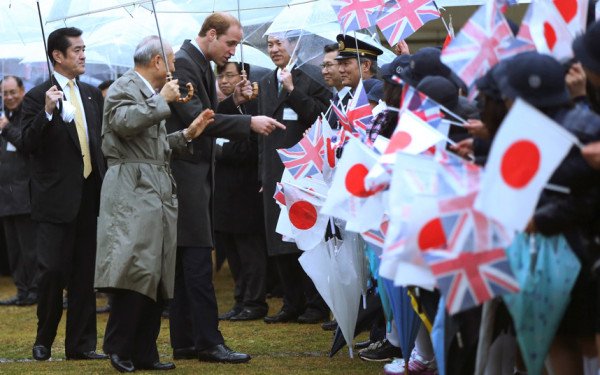
On the first day of his tour Prince William visited the Nakajima tea house, built 350 years ago in Japan’s Edo period, in the middle of a small lake within the Hama-Rikyu gardens.
As he entered the tea house, Prince William removed his shoes like the other guests, which included Tokyo governor Yoichi Masuzoe.
Dr. Genshitsu Sen, who is 92 and the 15th generation of his family to hold a senior role in the spiritual art of tea making, performed the traditional ceremony.
He also made tea for Prince William’s parents, Prince Charles and Princess Diana, when they visited Kyoto in 1986. Close to 100,000 people flocked to a parade in Tokyo at the time, as so-called “Diana Fever” swept the nation.
A number of gifts were given to Prince William, including a box of crackers, a book about the tea ceremony and a modern tea bowl decorated with a horse design in celebration of Prince George.
On February 27, Prince William is due to meet fellow royals Emperor Akihito and Empress Michiko at the Imperial Palace.
In this his first visit to Japan, Prince William will also be taken to the areas devastated by the 2011 tsunami and meet survivors.
In Shanghai, Prince William will launch the three-day Great Festival of Creativity at the city’s Long Museum on March 2.
[youtube 1-PdKs4hVIs 650]
Chinese mining tycoon Liu Han has been executed after being sentenced to death in May 2014 for “leading mafia-style crime and murder”, state media say.
Liu Han’s younger brother, Liu Wei and three other associates were also executed, Xinhua said, after China’s top court signed off on the move.
The former chairman of Hanlong Group is believed to have had links to former security tsar Zhou Yongkang, who is currently being investigated.
The Hanlong Group is a major private conglomerate based in Sichuan province, involved in multiple industries including mining, telecommunications and chemicals.
As head of the company, Liu Han was both rich and very influential.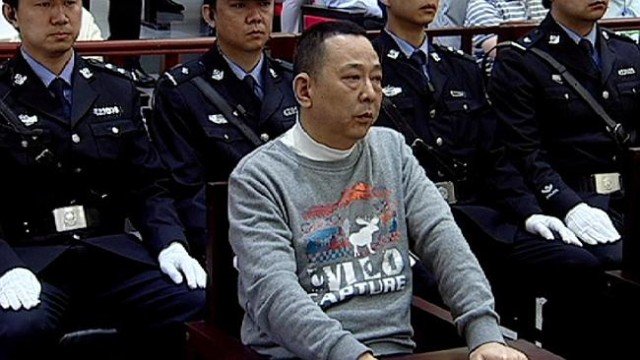
Xinhua said the company, which had been “harbored and indulged by government officials, had illegally monopolized the gaming business in Guanghan City in Sichuan province, tyrannized local people and seriously harmed the local economic and social order”.
In recent months, several top officials from Sichuan province have come under scrutiny.
Sichuan was a power base of Zhou Yongkang, China’s former domestic security chief who is now the subject of a corruption probe.
Zhou Yongkang was the party secretary in Sichuan before becoming head of China’s public security ministry in 2003.
He was arrested in December 2014, the latest and by far the most senior figure to be handed over to prosecutors as part of President Xi Jinping’s crackdown on corruption.
Official reports do not specifically link Liu Han’s case with Zhou Yongkang.
Liu Han was an associate of Zhou Bin, Zhou Yongkang’s son, the South China Morning Post reported.
[youtube PnwIn8hoV5U 650]
Twitter users in Argentina and China have ridiculed President Cristina Fernandez de Kirchner for poking fun at how the Chinese speak.
During a visit to China, the Argentine leader made reference to how some Chinese struggle to pronounce the letter “r”.
Tweeting in Spanish, Cristina Fernandez de Kirchner wondered whether those at an event about trade were there for “lice” and “petloleum”.
Her supporters said it was a light-hearted joke, but others disagreed.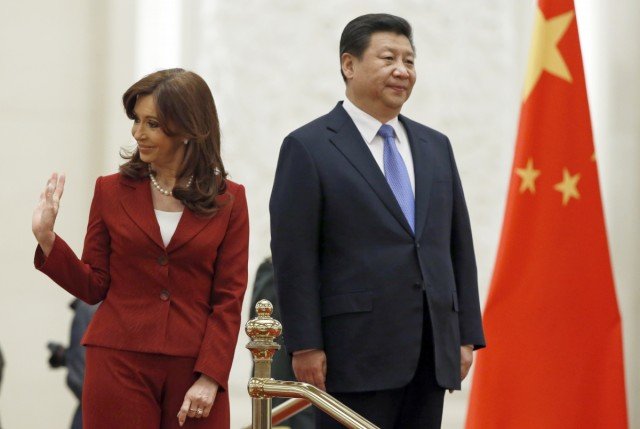
Cristina Fernandez de Kirchner suggested that the Chinese struggled to pronounce “rice”, “petroleum” and “Campora”, the Spanish name given to the youth wing of her political party.
“More than 1,000 participants at the event… Are they all from the Campola and in it only for the lice and petloleum?” she tweeted.
It was a play on a domestic political joke: her critics accuse her supporters of attending party events only so they can get a free sandwich and a soft drink.
Cristina Fernandez de Kirchner, a prolific Twitter user, later added: “Sorry. You know what? The levels of ridiculousness and absurdity are so high that they can only be digested with humor.”
Campola and China became trending topics on Twitter in Argentina and the episode filled the front pages of all newspapers.
Cristina Fernandez de Kirchner was in China to boost trade with Argentina.
[youtube _tD0UTBHBTc 650]
North Korean leader Kim Jong-un has accepted an invitation to Moscow in May, South Korea’s Yonhap reports.
The news agency cites a written response from the Kremlin, but says it does not mention Kim Jong-un by name.
Yonhap quotes a Unification Ministry official as saying the reference to the leader could be ambiguous, as Kim Yong-un is the nominal head of state.
Kim Jong-un has not made any overseas visits since taking power in North Korea in late 2011.
His first destination will been keenly watched for what it might indicate about his policies and strategy.
Earlier this month, reports emerged suggesting Russia could be the recipient of Kim Jong-un’s first official visit.
Foreign Minister Sergei Lavrov told journalists on January 21 that Russia had invited Kim Jong-un to the May 9 celebrations to mark the 70th anniversary of the end of World War Two.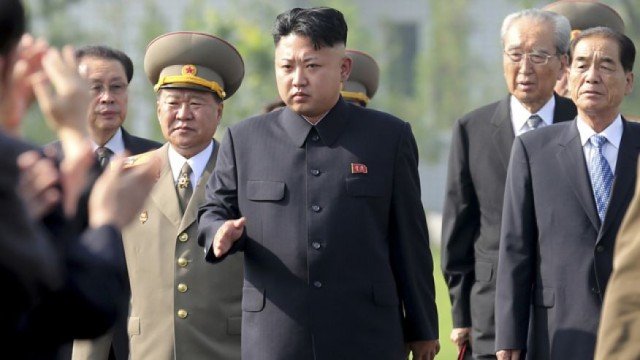
He said that the “first signal was positive” from the North Korean government.
Yonhap news agency said the response from the Russian presidential office confirmed that North Korea’s leader was among heads of state from 20 nations who had confirmed plans to attend.
However, the response did not specify Kim Jong-un by name and said: “The list of attendees has not been finalized yet, as we continue a process of confirming the attendance of those invited,” Yonhap reported.
There has been no statement from North Korea. Kim Yong-un, whose official title is president of the Presidium of the Supreme People’s Assembly, has more traditionally represented North Korea at overseas events.
Visits by Kim Jong-un’s late father, Kim Jong-il, were never announced ahead of his departure.
The late Kim Jong-il visited Russia in August 2011, shortly before his death. But he paid more regular visits to China which, under his leadership, was seen as Pyongyang’s closest ally.
If Kim Jong-un did choose to visit Moscow ahead of Beijing, the decision would be seen as significant – and as a snub to Chinese President Xi Jinping.
In recent years, China has come under pressure from Japan, South Korea and the US to exert more pressure on Pyongyang over its nuclear program.
Beijing has, on some occasions, expressed exasperation with its northern neighbor via official media channels.
It also backed UN resolutions strengthening sanctions on Pyongyang after its recent missile and nuclear tests in 2013.
[youtube ekkBFaMUg3M 650]
China is investigating former President Hu Jintao’s most senior aide, Ling Jihua, state media report.
Ling Jihua is accused of “disciplinary violations”, Xinhua news agency said, which usually refers to corruption.
He was demoted in 2012 after reports that his son had died crashing his Ferrari sports car in Beijing.
Correspondents say the investigation shows current President Xi Jinping feels secure enough to detain even the trusted advisers of his predecessor.
Xi Jinping took over from Hu Jintao as the Communist Party leader and China’s president in late 2012.
Since the transition, Xi Jinping has introduced a wide-ranging crackdown on corruption, warning it could threaten the party’s very survival.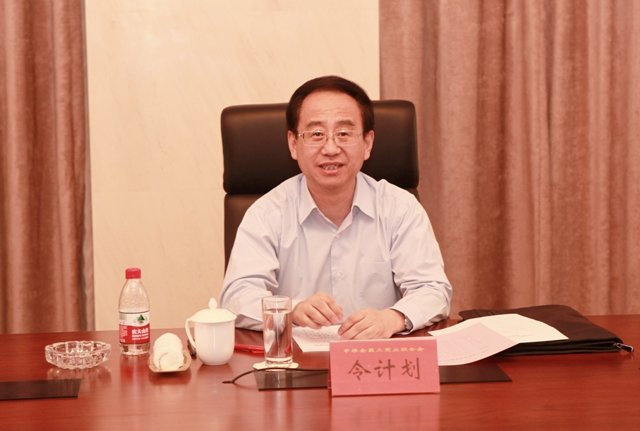
Earlier this month it was announced that former Chinese security chief Zhou Yongkang was facing corruption charges – a move that sent shockwaves through the political elite.
A week later, former top economic official Liu Tienan was jailed for life for accepting millions of dollars in bribes.
Critics say President Xi Jinping’s campaign is as much about eliminating political rivals as it is about tackling corruption.
Until the scandal involving his son, Ling Jihua had been tipped for promotion to the party’s Politburo.
Instead, he was moved from head of the Central Committee’s General Office – in effect chief of staff to China’s leader – and appointed to the less influential post of head of the United Front Work Department.
The identity of those inside the Ferrari was never revealed and censors blocked online comments mentioning the crash.
However, reports said Ling Jihua’s son was behind the wheel and the two passengers were described as scantily-clad women.
Ling Jihua was accused of trying to cover up the scandal.
[youtube u0ABKV7E0oU 650]
In a fiery statement, North Korea has threatened unspecified attacks on the US in an escalation of a war of words following the Sony Pictures Entertainment cyber-attacks.
North Korea warned of strikes against the White House, Pentagon and “the whole US mainland”.
The communist country denies US claims it is behind cyber-attacks linked to The Interview movie that features the fictional killing of its leader Kim Jong-un.
North Korea has a long history of issuing threats against the US.
The latest statement comes days after the US formally accused North Korea of orchestrating a massive cyber attack on Sony Pictures.
“The army and people of the DPRK [North Korea] are fully ready to stand in confrontation with the US in all war spaces including cyber warfare space,” a long statement carried by the official Korean Central News Agency said.
“Our toughest counteraction will be boldly taken against the White House, the Pentagon and the whole US mainland, the cesspool of terrorism, by far surpassing the ‘symmetric counteraction’ declared by Obama.”
It also accuses President Barack Obama of “recklessly making the rumor” that North Korea was behind the Sony attack.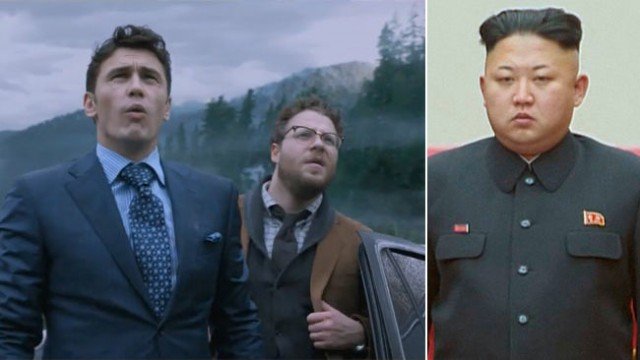
The statement also said it “estimates highly the righteous action” taken by the hackers of Sony, although it is “not aware of where they are”.
The hack resulted in unreleased films and the script for the next James Bond film being leaked online.
Details of Sony finances and private emails between producers and Hollywood figures were also released.
The eventual fallout from the attack saw Sony cancel the Christmas release of The Interview, a comedy depicting the assassination of North Korean leader Kim Jong-un.
That decision followed threats made by a group that hacked into Sony’s servers and leaked sensitive information and emails.
North Korea has denied being behind the attacks, and offered to hold a joint inquiry with the US.
The US turned down the offer, and President Barack Obama said it was considering putting North Korea back on its list of terrorism sponsors, a move that further angered Pyongyang.
North Korea had been on the US list of state sponsors of terrorism for two decades until the White House removed it in 2008, as part of now-stalled negotiations relating to Pyongyang’s nuclear program.
In an interview with CNN on December 21, Barack Obama promised to respond “proportionately” to the cyber-attack.
“I’ll wait to review what the findings are,” he said, adding that he did not think the attack “was an act of war”.
The US has reportedly also asked China to curb cyber-attacks by North Korea.
China is North Korea’s close ally and is seen as the nation with the most influence over Pyongyang.
Chinese Foreign Minister Wang Yi held a telephone conversation with his US counterpart John Kerry on December 21 in which they discussed the Sony row.
Wang Yi said China was “against all forms of cyber-attacks and cyber-terrorism” but did not refer directly to North Korea.
In a statement posted on China’s foreign ministry’s website on December 22, Wang Yi said that China “opposes any country or person using infrastructure from another country to launch a cyber attack on a third-party country”.
At a later news conference, a foreign ministry spokesman said China wanted to “engage in constructive co-operation with the international community in cyber security on the basis of mutual respect and mutual trust”.
Asked to respond to claims that North Korea was using Chinese facilities for cyber-attacks, the spokesman added: “I think to arrive at any conclusion, sufficient facts and evidence are needed. China will handle the case on the basis of facts, international laws and Chinese laws.”
Correspondents say the issue of hacking is a sensitive one in China-US relations, with the two sides frequently trading accusations of cyber-espionage.
[youtube Uc0Ln7s6SV8 650]
A kindergarten building has collapsed in northern China killing three children, state media says.
The children were taken to hospital but died of their injuries, according to the official Xinhua News Agency.
Three other children were injured in the incident, in Yongqing county, in Hebei province, Xinhua added.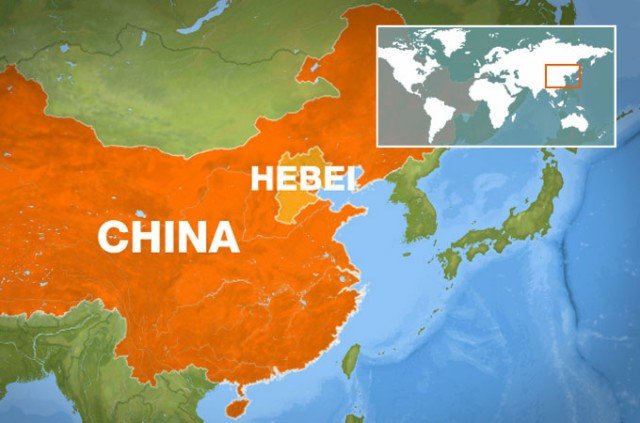
Safety standards of school buildings have been a public concern in China since many collapsed during a devastating earthquake in 2008.
Thousands of school children were among the almost 90,000 dead, leading to a public outcry over shoddy construction and the lack of safety measures.
Five children were killed earlier in the week in eastern China, when the wall at the side of a basketball court suddenly collapsed, officials said.
President Xi Jinping has presided over China’s first state commemoration of the Nanjing massacre.
China says 300,000 civilians were massacred when Nanjing was occupied by Japan’s troops in 1937, although some Japanese nationalists dispute this.
President Xi Jinping told survivors that to deny a crime was to repeat it but insisted the ceremony was to promote peace, not prolong hatred.
Relations between China and Japan have been strained in recent years.
They have clashed over island territory in the East China Sea as well as over Japan’s insistence on honoring its war dead, including convicted war criminals, at the Yasukuni shrine.
The ceremony, which came on the 77th anniversary of the massacre, is part of three new public holidays intended to mark the conflict between the two countries.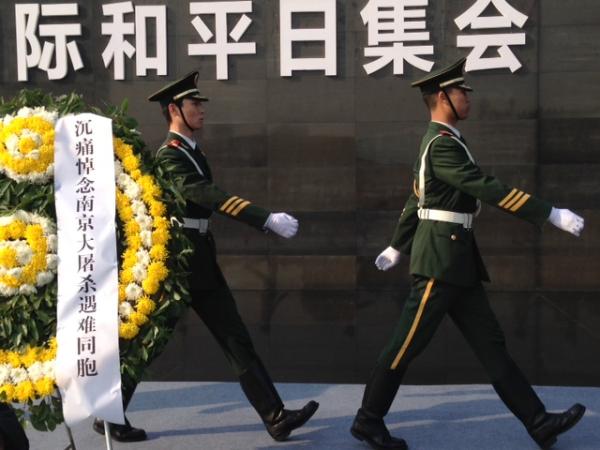
A crowd of about 10,000 people attended the event in Nanjing, taking part in a minute’s silence to honor those killed. They included survivors of the massacre, as well as soldiers and students.
In a speech at the event, President Xi Jinping criticized Japanese nationalists for denying the atrocity took place.
“Anyone who tries to deny the massacre will not be allowed by history, the souls of the 300,000 deceased victims, 1.3 billion Chinese people and all people loving peace and justice in the world,” the president said.
Xi Jinping added that China should not “bear hatred against an entire nation just because a small minority of militarists launched aggressive wars,” according to the state-run Xinhua news agency.
Millions of Chinese people were killed when Japan occupied China in the 1930s and 1940s.
[youtube OWsJoMUPdkM 650]
Pope Francis has declined to meet the exiled Tibetan leader the Dalai Lama because of the “delicate situation” with China, the Vatican announces.
The Dalai Lama, who is visiting Rome, had requested a meeting.
A Vatican spokesman said that although the Pope held him “in very high regard”, the request had been declined “for obvious reasons”.
Correspondents say the Vatican does not want to jeopardize efforts to improve relations with China.
China describes the Dalai Lama as a separatist and reacts angrily when foreign dignitaries meet him.
The Dalai Lama fled to India in 1959 after Chinese troops crushed an attempted uprising in Tibet.
He now advocates a “middle way” with China, seeking autonomy but not independence for Tibet.
The Dalai Lama was awarded the Nobel Peace Prize in 1989.
“Pope Francis obviously holds the Dalai Lama in very high regard but he will not be meeting any of the Nobel laureates,” a Vatican spokesman said.
He added that the pontiff would send a video message to the conference.
The Dalai Lama told Italian media that he had approached the Vatican regarding a meeting but had been told it could create inconveniences.
Analysts say the Vatican and China are at odds over control of the Catholic Church in China.
The Chinese Communist Party oversees an official community, known as the Patriotic Association and believed to number about 12 million people, but there is also a much larger underground Church that is loyal to the Pope.
A serious bone of contention between China and the Vatican is which side should have the final say in the appointment of bishops.
A Vatican official said the Pope’s decision was “not taken out of fear but to avoid any suffering by those who have already suffered”.
The last time the Dalai Lama was granted a papal audience was in 2006 when he met former Pope Benedict XVI.
The Dalai Lama is in Rome for a meeting of Nobel Peace Prize winners. It was initially to be held in South Africa but was relocated to Rome after South Africa refused the Dalai Lama a visa.
[youtube PZetoBF9asI 650]
China’s ex-security chief Zhou Yongkang has been arrested and expelled from the Communist Party, state media reported.
Zhou Yongkang is the most senior Chinese official to be investigated for corruption.
The Supreme People’s Procuratorate, China’s top prosecuting body, said it had opened a formal probe against him.
Before he retired two years ago, Zhou Yongkang was the head of China’s vast internal security apparatus.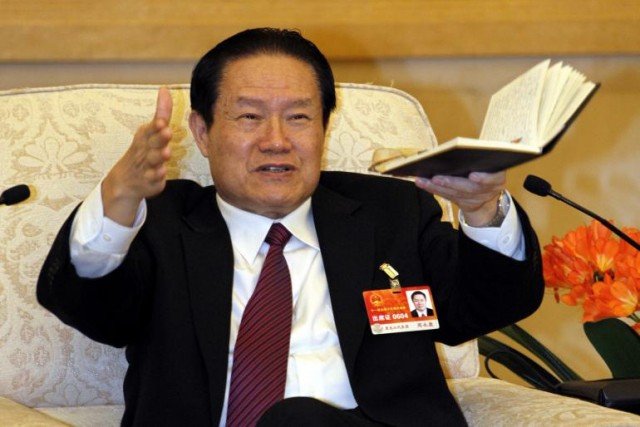
Many of his former associates and relatives also face corruption probes.
Since coming to power, Chinese President Xi Jinping has launched a high-profile campaign to weed out corruption among party and government officials.
Zhou Yongkang was accused of several crimes, including “serious violations of party discipline”, “accepting large sums of bribes”, “disclosing party and state secrets” and “committing adultery with several women” as part of corrupt transactions, Xinhua news agency reported.
His arrest was announced in a statement by the Supreme People’s Procuratorate, released late on Friday night.
Taiwan PM Jiang Yi-huah has resigned after his ruling pro-China party suffered stiff defeats in local elections.
The Kuomintang party (KMT) appears to have lost control of districts across Taiwan, including the mayor’s office in the capital, Taipei.
Saturday’s polls were widely seen as a referendum on relations with China.
KMT supporters had argued for good relations with China, which views Taiwan as a renegade province.
China and Taiwan, a close US ally, have been ruled separately since the end of a civil war in 1949.
Jiang Yi-huah told reporters he was stepping down in order to take responsibility for the defeat.
Moments later, President Ma Ying-jeou, who is also KMT chairman, apologized to supporters “for making everyone disappointed”.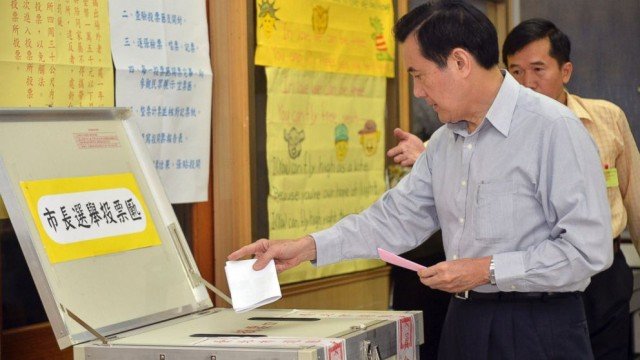
“I’ve received the message people have sent via these elections,” President Ma Ying-jeou told a news conference.
“It’s my responsibility and I will quickly offer a party reform plan to address everyone’s demands. I won’t avoid responsibility.”
The race in Taipei was watched with particular attention as a test of Ma Ying-jeou’s pro-China policy.
In the event, an independent opposition-backed candidate, Ko Wen-je, claimed victory over the KMT’s Sean Lien.
Sean Lien publicly bowed in defeat along with his solemn-faced supporters.
“We congratulate Mr. Ko,” he said in his concession speech.
“I’m sorry I didn’t win this election.”
More than 18 million eligible voters were registered to vote, choosing from among 20,000 candidates who were running for more than 11,000 positions.
Some voters fear that if the KMT is allowed to continue building strong ties with China, Taiwan may become too economically dependent on the mainland and vulnerable to its pressures to reunify one day.
They distrust the KMT, regardless of whether the deals signed with Beijing are good for Taiwan.
KMT supporters, on the other hand, feel that Taiwan needs good relations with its biggest trade partner to breathe new life into the island’s ailing economy.
They feared a victory by the opposition Democratic Progressive Party (DPP) could cause relations with China and Taiwan’s economy to regress.
The DPP supports Taiwan’s formal independence from China, something Beijing strongly opposes.
In 2016, Taiwan will hold the more important presidential and legislative polls.
[youtube q52HJYGpNMg 650]
Taiwan is holding the island’s biggest local election, which is widely seen as a referendum on the China policy of the ruling party.
Almost 20,000 candidates are running for more than 11,000 posts on nine levels of government.
Critics say the ruling Kuomintang (KMT) party is too close to China, while its supporters say Taiwan needs good relations with its powerful neighbor.
China sees Taiwan as renegade province with which it should be re-united.
Taiwan and China have been ruled separately since the end of a civil war in 1949.
Taiwan only began allowing truly democratic elections – with opposition party candidates and universal suffrage – in the late 1980s.
Polling stations across the island opened at 08:00 local time, with more than 18 million eligible voters registered.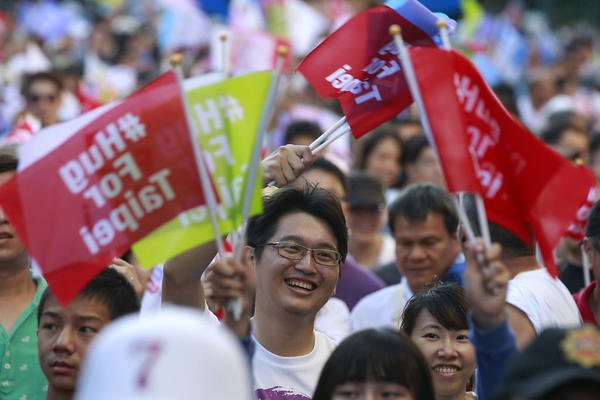
The KMT currently holds the presidency, a legislative majority, and most of Taiwan’s cities and counties, although recent opinion polls have suggested that it risks losing its traditional strongholds such as Taipei and Taichung.
Some voters fear that if the KMT is allowed to continue building strong ties with China, Taiwan may become too economically dependent on the mainland and vulnerable to its pressures to reunify one day.
They distrust the KMT, regardless of whether the deals signed with Beijing are good for Taiwan, our correspondent says.
KMT supporters, on the other hand, feel that Taiwan needs good relations with its biggest trade partner to breath new life into the island’s ailing economy.
They fear a victory by the opposition DPP party could cause relations with China and Taiwan’s economy to regress.
The DPP supports Taiwan’s formal independence from China, something Beijing strongly opposes.
In 2016, Taiwan will hold the more important presidential and legislative polls.
[youtube WKPzmq_QbW0 650]
Hong Kong pro-democracy protest leaders have been stopped from boarding a plane to Beijing.
The three had hoped to meet China’s leaders as part of their push for greater democracy, but were told their travel permits were invalid.
Protesters have been camped out on the streets of the territory since late September.
They want Beijing to allow more candidates to stand in the territory’s next leadership election in 2017.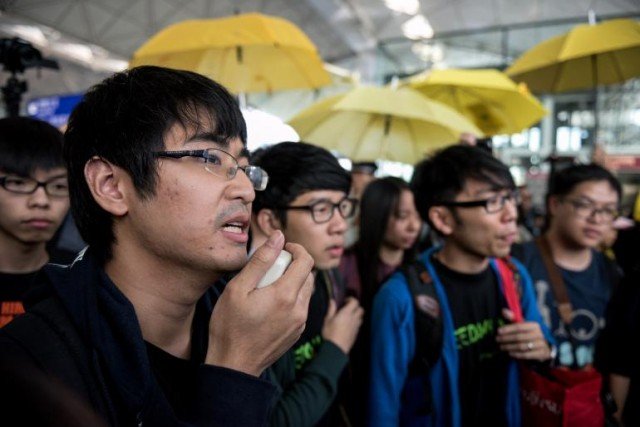
They were mobbed at the airport by fellow democracy activists, who unfurled yellow umbrellas – a symbol of Hong Kong’s democracy movement.
They were led by Alex Chow, who heads the Hong Kong Federation of Students.
An editorial in China’s state-run Global Times, written before the activists were stopped at the airport, said the group would have had little chance of meeting Chinese leaders.
Hong Kong’s Occupy Central movement had “failed”, the editorial concluded.
Chinese President Xi Jinping and Japanese PM Shinzo Abe have met for formal talks after more than two years of severe tension over a territorial dispute.
Xi Jinping and Shinzo Abe met on the sidelines of the Asia-Pacific Economic Co-operation (APEC) summit in Beijing.
Their first meeting included a public handshake with little sign of warmth.
In a speech to APEC, President Barack Obama has meanwhile announced big changes to visa arrangements with China.
Multiple entry short-term visas for businessmen and tourists will be extended to 10 years – up from one year.
Those for students rise from one year to five.
Barack Obama also stressed the importance of ties between China and the US, saying “the US welcomes the rise of a prosperous, peaceful and stable China.”
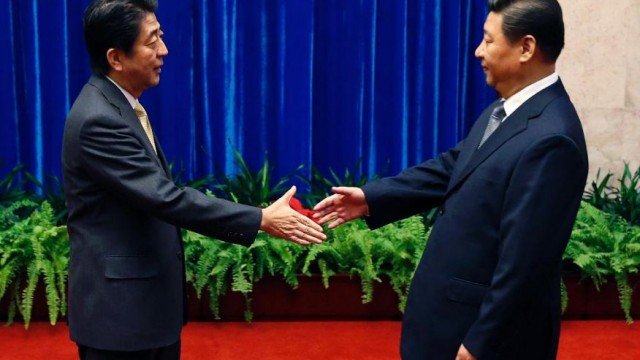
Japanese PM Shinzo Abe and Chinese President Xi Jinping have met for formal talks after more than two years of severe tension over a territorial dispute
His comments come amid underlying tension between the US and China over Beijing’s growing regional influence.
Relations between China and Japan have long been soured by a row over islands in the East China Sea.
The uninhabited but strategically important islands, known as Diaoyu by China and Senkaku by Japan, are controlled by Japan but also claimed by China.
Tokyo’s decision to purchase three of them from their private Japanese owner in September 2012 led to an escalation in a dispute that has rumbled quietly for years.
The Chinese and Japanese leaders interacted awkwardly as they posed for an unsmiling photo after their talks.
Shinzo Abe said the meeting – which came three days after the two sides agreed to work to prevent the territorial dispute from escalating – was “the first step for improving ties by returning to mutually beneficial relations based on common strategic interests”.
He also said they had agreed to start preparations to establish a maritime crisis mechanism.
There have been fears that a clash – accidental or otherwise – between Chinese and Japanese paramilitary vessels patrolling waters around the disputed islands could trigger a conflict.
Xi Jinping told Shinzo Abe that China hoped Japan would follow a path of peaceful development and adopt prudent military and security policies.
Relations have also been hampered by what China sees as Japan’s failure to adequately acknowledge its war-time conduct.
[youtube hVep_ICdqoo 650]
The Chinese government’s expenditures on overseas trips, lavish receptions and official cars have dropped by almost $9 billion over the past year.
The announcement comes as President Xi Jinping’s campaign to tackle decadent working practices in the ruling Communist Party draws to a close.
More than 150,000 “ghost jobs”, where people are paid even if they do not turn up, were found in the clean-up.
Xi Jinping has repeatedly said corruption threatens the party’s existence.
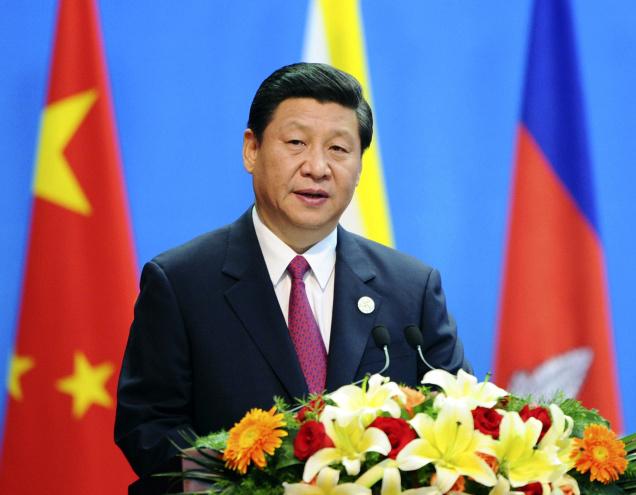
President Xi Jinping conducted a campaign to tackle decadent working practices in the ruling Communist Party
The stated aim of the mass-line campaign, as it is known, is to strengthen the party’s ties with the Chinese population.
Official spending on government cars, receptions and trips was down almost a third compared with the year before.
Past leaders have warned that if you fight corruption too much then you will destroy the party – but if you fight it too little then you will destroy the country.
Hong Kong protesters are preparing for huge pro-democracy rallies on the National Day as leader CY Leung has urged them to back electoral reforms set out by Beijing.
Speaking early on the National Day holiday, CY Leung said Hong Kong should work with Beijing to achieve progress.
The protesters want Beijing to withdraw plans to vet candidates for the next Hong Kong leadership election in 2017.
Activists say they expect the biggest demonstrations yet on the streets to coincide with the holiday.
By midday, protesters were starting to fill up the main protests site in the Central business district, Causeway Bay and Mong Kok. A fourth protest site has also spread to Canton Road in Tsim Sha Tsui, several roads south of Mong Kok.
CY Leung, Hong Kong’s chief executive, has rejected campaigners’ calls for him to stand down. Chinese President Xi Jinping has reaffirmed Beijing’s control over the territory.
A rumbling protest campaign ballooned into mass street demonstrations at the weekend.
Police responded initially with tear gas and pepper spray, but riot police later withdrew and since early on Monday the situation has remained calm.
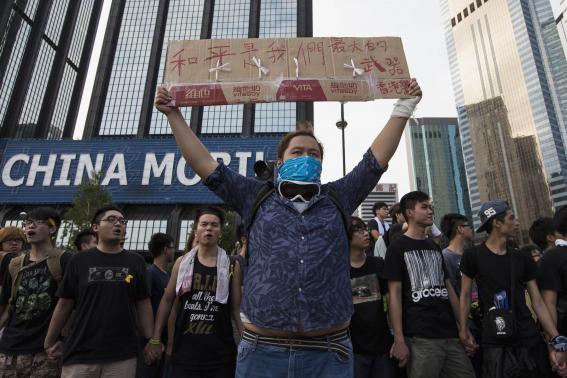
The protesters want Beijing to withdraw plans to vet candidates for the next Hong Kong leadership election in 2017 (photo Reuters)
Crowds swelled again on Tuesday night and the demonstrators – who include student groups, supporters of the Occupy Central movement and others angered by the police response – say they are confident of greater numbers on Wednesday, October 1.
So far there are no signs of concessions from Beijing.
On September 30, President Xi Jinping told Communist Party leaders that his government would “steadfastly safeguard the long-term prosperity and stability of Hong Kong and Macau”.
The protests are seen as a direct challenge to Beijing’s grip on the territory’s politics. Analysts say leaders are worried that calls for democracy could spread to mainland cities.
News of the protests is being heavily censored in mainland China. Media have blamed “radical opposition forces” for stirring up trouble.
Meanwhile the US restated its position on the protests, saying that a genuine choice of candidates in the election would enhance the legitimacy of the chief executive.
On September 30, state department spokeswoman Jen Psaki said that Secretary of State John Kerry would discuss the protests with Chinese Foreign Minister Wang Yi when the pair meet on October 1.
[youtube Xc1_VbfN0EA 650]
Microsoft has become the first major console maker to enter the Chinese market after launching Xbox One.
The first consoles were sold in Shanghai, priced at 4,299 yuan ($699). Sony and Nintendo are yet to launch their respective products.
In January, the Chinese government lifted a 14-year ban on consoles, made because of worries over content.
However, many popular titles, such as Call of Duty, will still be banned.
Only 10 games were available to buy on the Xbox One’s release – but Microsoft has said 70 titles are in the pipeline.
Beating its rivals to the market may give Microsoft a much-needed sales boost. Its console is currently being outsold by Sony’s PlayStation 4 in all major markets.

Microsoft has become the first major console maker to enter the Chinese market after launching Xbox One (photo Reuters)
Sony has set up business partnerships to launch the PS4 in China, but a date has not yet been set.
Both companies will compete with a thriving black market in illegally imported consoles playing pirated versions of games.
They will also come up against mobile games, which are not banned in China and are extremely popular.
The Xbox One launch was originally set to happen last week but was delayed – Microsoft did not give a reason why.
The company is currently the focus of an anti-monopoly investigation relating to its Office software.
Its chief executive Satya Nadella visited China last week, and pledged to help the government with its investigation.
Getting games to market is likely to require negotiation with regulators, who favor educational games over those with violent themes.
But that could play well for Microsoft thanks to its recent acquisition of Minecraft – a block-building online game that is massively popular in the Western world, particularly with young children.
Microsoft bought Minecraft’s Swedish developer Mojang earlier this month for $2.5 billion.
[youtube WtiXkOc0R34 650]
Occupy Central protesters have issued demands for the Chinese government to scrap rules outlining the election of the next chief executive in 2017.
The protest group also wants the resumption of public consultation on democratic reforms.
Thousands of protesters are camped outside government headquarters in central Hong Kong.
Occupy Central leader Benny Tai announced the launch of the campaign to the cheers of supporters on September 27.
A statement said that Hong Kong Chief Executive CY Leung had “failed to deliver on political reform”.
“We demand CY Leung deliver a new report on political reform to the central government, which must adequately reflect the demands of Hong Kong people for democracy,” it said.
“If CY Leung does not respond, we will escalate our actions.”
The movement had originally planned to paralyze the central business district on September 24, but organizers brought forward the start of the protest and changed the location in an apparent bid to harness momentum from student protests outside the government complex.
Student activists had stormed into a courtyard of the complex late on September 26 and scuffled with police using pepper spray.
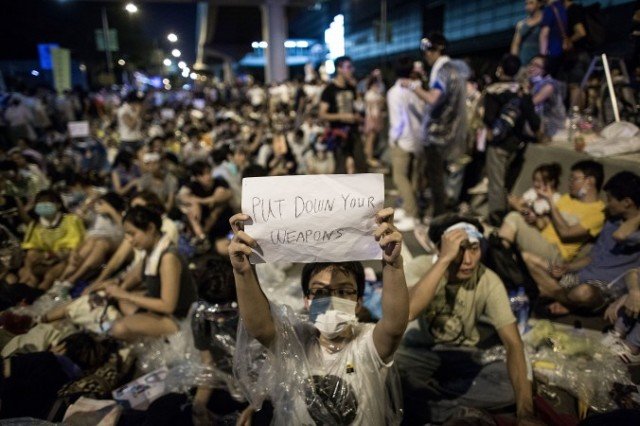
Occupy Central protesters have issued demands for the Chinese government to scrap rules outlining the election of the next chief executive in 2017
Police said they made scores of arrests including prominent student activist leader Joshua Wong.
However, some students expressed unease that their protest was apparently being taken over by Occupy Central.
The protests at government headquarters followed a week-long strike by thousands of students.
Unrest began when the Chinese government announced that candidates for the 2017 chief executive election would first have to be approved by a nominating committee.
Activists have argued that this does not amount to true democracy.
Many of those who spent the night on the streets wore plastic raincoats and goggles in case police deployed more pepper spray.
Riot police stood nearby.
“The courage of the students and members of the public in their spontaneous decision to stay has touched many Hong Kong people,” Occupy Central said in a statement.
“Yet the government has remained unmoved. As the wheel of time has reached this point, we have decided to arise and act.”
At least 34 people have been injured since the protests began, including four police officers and 11 government staff and guards, authorities said.
One police officer suffered a gash after being poked by one of the umbrellas protesters are using to deflect pepper spray.
[youtube 17iX10LBJ7s 650]
[youtube 2KADq3_6Voc 650]
Thousands of students in Hong Kong have begun a week-long boycott of classes to protest against China’s stance on electoral reform in the territory.
The movement is a prelude to a larger protest on October 1 planned by pro-democracy group Occupy Central.
Beijing has rejected open nominations for the city’s leadership poll, dashing hopes of those seeking full democracy.
The boycott is being organised by groups such as the Hong Kong Federation of Students and Scholarism.
Student activists are also organising a series of rallies and public lectures in a park near government offices.
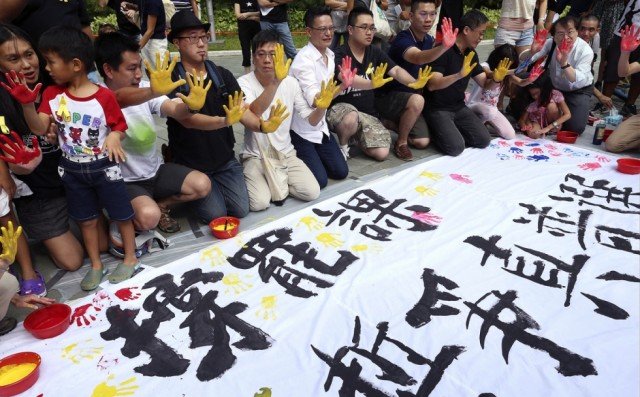
Thousands of students in Hong Kong have begun a week-long boycott of classes to protest against China’s stance on electoral reform in the territory
About 400 academics and non-teaching staff are also taking part in support of the students, according to the South China Morning Post.
A larger pro-democracy protest is due to take place next month. Occupy Central has pledged to stage a sit-in at Hong Kong’s financial district, which critics have said may shut down the area.
The issue of how Hong Kong can choose its leader gripped the city in recent months, sparking protests from both the pro-democracy and pro-Beijing camps.
The Chinese government has promised direct elections for Hong Kong’s leader, the chief executive, by 2017.
But in August, it ruled that voters would only have a choice from a list of two or three candidates selected by a nominating committee.
Democracy activists say China will use this committee to screen out candidates it disapproves of.
Pro-Beijing activists, meanwhile, believe the other camp is disrupting Hong Kong’s peace and stability.
The protesting students say Beijing’s decision does not amount to the greater democracy Hong Kong was promised when it was handed back from Britain to China in 1997.
However, the communist leadership in Beijing is turning firmly against ideas of political reform at home and has no interest in encouraging noisy critics.
GlaxoSmithKline (GSK) has received a record $490 million fine after a Chinese court found it guilty of bribery.
The record penalty follows allegations the pharmaceutical giant paid out bribes to doctors and hospitals in order to have their products promoted.
The court gave GSK’s former head of Chinese operations, Mark Reilly, a suspended three-year prison sentence and he is set to be deported.
Other GSK executives have also been given suspended jail sentences.
The guilty verdict was delivered after a one-day trial at a court in Changsha, according to the Xinhua news agency.
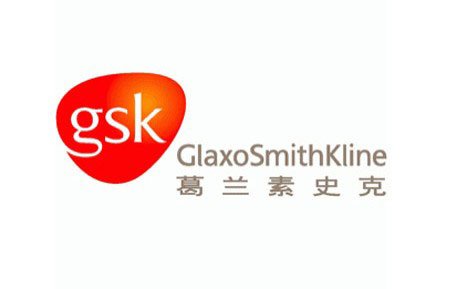
GSK has received a record $490 million fine after a Chinese court found it guilty of bribery
Chinese authorities first announced they were investigating GSK in July last year, in what has become the biggest corruption scandal to hit a foreign firm in years. The company was accused of having made an estimated $150 million in illegal profits
GSK said it had “published a statement of apology to the Chinese government and its people”.
“Reaching a conclusion in the investigation of our Chinese business is important, but this has been a deeply disappointing matter for GSK,” said GSK CEO Andrew Witty in a statement.
“We have and will continue to learn from this. GSK has been in China for close to a hundred years and we remain fully committed to the country and its people,” he said.
“We will also continue to invest directly in the country to support the government’s health care reform agenda and long-term plans for economic growth.”
[youtube Fcfh2Iohu2Y 650]
Two Chinese Y-8 maritime patrol planes violated Taiwan’s airspace on August 25, officials said, causing Taiwan to scramble jets.
Taiwan said the Chinese military aircraft entered the island’s ADIZ (air defense identification zone) in both the morning and the afternoon.
Taiwan scrambled planes which “followed them closely to make sure they left”, an air force spokesman said.
The alleged incident came days after the US accused a Chinese plane of dangerous maneuvers near its aircraft.
Washington said the Chinese aircraft came within 10 meters of a US Navy patrol plane over international waters off Hainan Island on August 19.
China described the claims as “groundless”, saying the pilot’s conduct was “professional”.
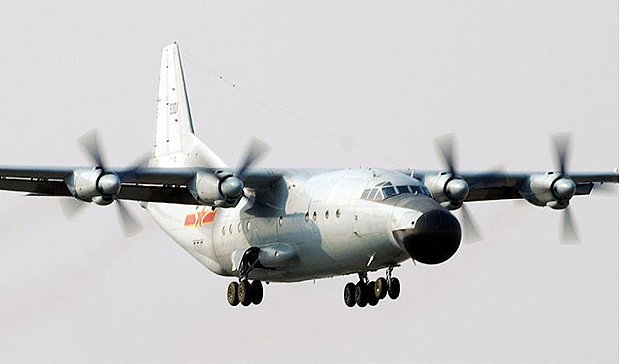
Chinese Y-8 maritime patrol planes violated Taiwan’s airspace on August 25
In the latest incident, Taiwan said the two Chinese planes violated its airspace twice each as they flew towards the South China Sea and back.
Mirage 2000-5s and Indigenous Defense Fighters were scrambled in response, officials said.
In a statement to Reuters news agency, China’s defense ministry said its planes had carried out a “routine flight” in “relevant airspace”. There was no “abnormality”, the statement said.
Beijing considers Taiwan part of China but the two have been governed separately since the end of the Chinese civil war in 1949.
Economic ties have improved significantly in recent years but on a political level the two remain far apart.
China, meanwhile, has in recent years been taking a more assertive stance over its territorial claims in both the East China and South China seas, sparking a rise in regional tensions.
New Zealand dairy giant Fonterra said today it plans to take a 20% stake in Chinese infant food manufacturer Beingmate.
Fonterra will also spend $555 million on expanding its milk powder making capacity in New Zealand.
Beingmate is one of China’s biggest milk processors.
The tie-up would help create a global supply chain aimed at China’s market using Fonterra’s milk manufacturing partners in Australia and Europe.
It would also help Fonterra increase its share of China’s large and lucrative infant diary food market.
China relies on New Zealand for almost all its imports of milk powder.

Fonterra plans to take a 20 percent stake in Chinese infant food manufacturer Beingmate (photo Fonterra)
If successful, the new partnership between Beingmate and Fonterra would see the Chinese company set up a joint venture to buy a Fonterra plant in Australia.
It would also see Beingmate distribute Fonterra’s popular Anmum brand on the mainland.
Fonterra’s chief executive Theo Spierings said the partnership would be a “game changer” and that it would provide Fonterra with “a direct line into the infant formula market in China”.
He also said Fonterra would work with Beingmate “to evaluate mutual investments in dairy farms in China”.
“The partnership will create a fully integrated global supply chain from the farm gate direct to China’s consumers, using Fonterra’s milk pools and manufacturing sites in New Zealand, Australia, and Europe,” the company said.
Fonterra said the infant formula market in China was worth about $15.05 billion today and that it would be worth some $27.5bn by 2017.
“This growth is driven by increasing urbanization, higher disposable incomes, a preference for premium brands and relaxation of the one-child policy,” said Theo Spierings.
China puts a premium on imported dairy food products after a tainted milk formula scandal in 2008 killed six babies and made some 300,000 infants ill.
Following that, a food scare related to Fonterra products last year saw China ban all milk powder imports from New Zealand for a period of time.
Fonterra, which is a farmer-owned co-operative and the largest exporter of dairy products in the world, said it had found a bacterial strain in some of its products that can cause botulism.
Testing later found there had been no problem with the company’s diary products.
Fonterra was nevertheless fined $256,675 over the food scare, which led to a global product recall.
[youtube MjMvjbM_NL4 650]
Chinese authorities have shut down the 11th Beijing Independent Film Festival on its opening day, August 23.
Organizers said they had been under pressure from officials in recent days to cancel the festival, which had been due to run until the end of the month.
An attempt to move the venue from a suburb was blocked by local police.
It has been a rare opportunity for independent Chinese film makers to show their work, but is regarded with suspicion by the government.
The annual festival has suffered disruption in the past, including having its electricity supply cut.
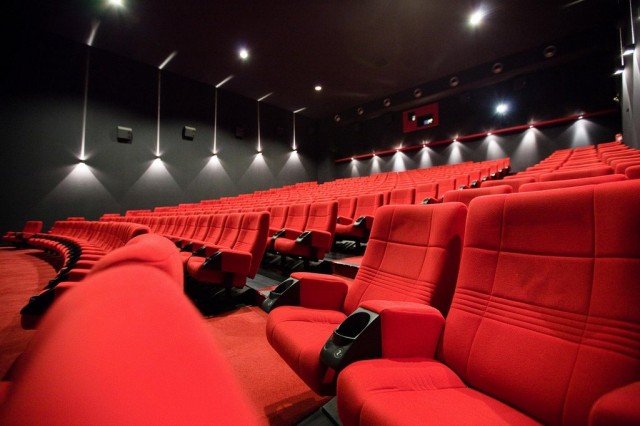
Chinese authorities have shut down the 11th Beijing Independent Film Festival on its opening day
The organizers said they had received a series of warnings from officials to cancel the festival – one report said they complied after being briefly detained on Friday.
Security was tight at the venue in the Beijing suburb of Songzhuang, with about two dozen men blocking the area and preventing around 30 film directors and members of the public from entering, the Associated Press reports.
The men, claiming to be villagers, tried to stop anyone from photographing or filming the scene, AP says.
The Chinese government keeps a tight control on information and the media – and is suspicious of independent films that could contain criticism of the Communist party and its policies.
President Xi Jinping has stepped up repression of government critics since coming to office with the arrest of hundreds of bloggers.
Toyota is being caught in China’s anti-monopoly investigation.
The Japanese car maker said that Chinese regulators were looking into its Lexus luxury brand.
Audi, Chrysler and Mercedes-Benz are among carmakers and parts suppliers already under scrutiny for as-yet unspecified anti-competitive issues.
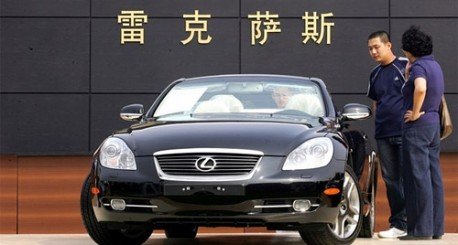
Toyota is being caught in China’s anti-monopoly investigation
A Toyota spokesman said the company was “co-operating fully with the queries from the authorities on Lexus”.
Although regulators have not set out the basis of their concerns, there have been reports in China of customers complaining about the high prices of imported vehicles and spare parts.
The technology and pharmaceutical sectors have also faced investigations in what analysts have said looks like an attempt to force down prices.
The investigations are being led by China’s National Development and Reform Commission (NDRC), which earlier this week raided a Mercedes office in Shanghai.
According to state news agency Xinhua, “inspectors are still collecting evidence and investigating whether Mercedes-Benz has used monopolistic tactics”.
Last month, China’s State Administration for Industry and Commerce – the body responsible for enforcing business laws – said it was looking into “alleged monopoly actions” by US tech firm Microsoft.
A Canadian couple is investigated by Chinese authorities on suspicion of stealing state secrets about China’s defense and the military, state media say.
Xinhua news agency named the suspects as Kevin and Julia Garratt. The couple runs a coffee shop in Dandong just across the border from North Korea.
The news agency said Dandong’s State Security Bureau was investigating the case.
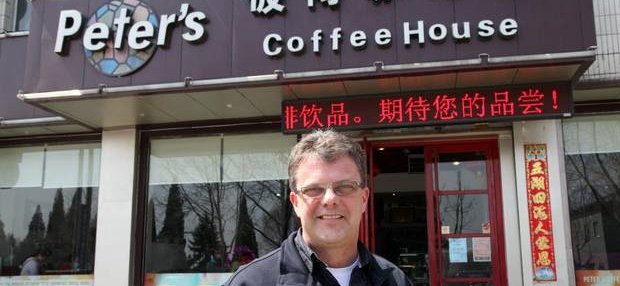
Kevin Garratt and his wife Julia couple run a coffee shop in Dandong just across the border from North Korea
Kevin and Julia Garratt taught in southern China for several years and then moved to Dandong, where they opened Peter’s Coffee House.
Dandong is the main China-North Korea border crossing and trade link.
The Xinhua report did not say whether the couple had been detained.
Besides running the cafe, the couple regularly held community events for people to practice their English and helped people to get in touch with North Korea tour organizers.
According to its website, the coffee shop is “only meters from the border of North Korea and Dandong’s Friendship Bridge” and is “the perfect stop off while en route to or returning from the Hermit Kingdom”.
Canada’s embassy in Beijing told Reuters news agency it was aware of the reports and stood “ready to provide assistance as required”.
Late last month, Canada announced that a top government research organization had been struck by Chinese “state-sponsored” hackers.
The Chinese embassy in Ottawa dismissed the report as a “groundless allegation”.
 Prev1...234...8Next
Prev1...234...8Next  Page 3 of 8
Page 3 of 8

























